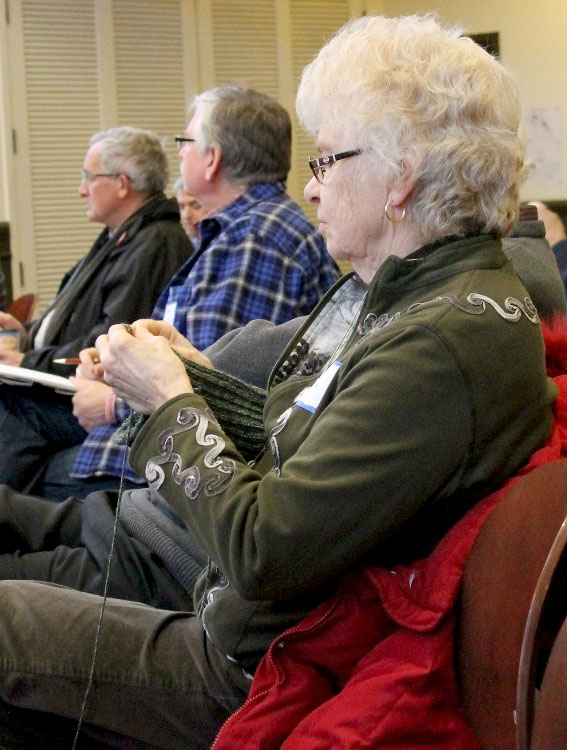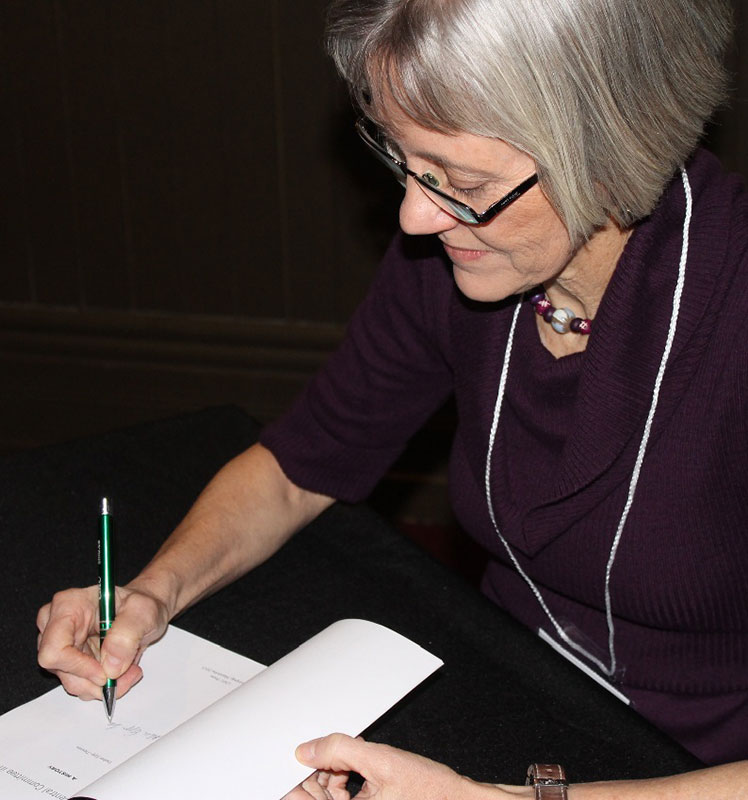On a cold, windy December day in Winnipeg in 1963, 40 men made the decision to form Mennonite Central Committee (MCC) Canada. Exactly 50 years later, a group of people braved another bitterly cold day in Winnipeg to reflect on those 50 years and contemplate MCC’s future.
On Dec. 13 and 14, 2013, the Mennonite Historical Society of Canada and the Chair in Mennonite Studies at the University of Winnipeg collaborated to present the 50th Anniversary History Conference of MCC in Canada. The launch of Esther Epp-Tiessen’s book Mennonite Central Committee in Canada: A History kicked off the conference.
The decision to form a national inter-Mennonite partnership for relief, immigration service and peace was a controversial one, said Epp-Tiessen, who spoke of “the agony and the ecstasy” in researching and writing this book.
From the stories that Epp-Tiessen uncovered, she presented a mosaic of what MCC in Canada represents, calling it a bridgebuilder within the Mennonite and Brethren in Christ family. “Today we take inter-Mennonite cooperation very much for granted,” she said. “That wasn’t always the case. Much of that cooperation happens at grassroots levels like thrift shops and relief sales.”
During a discussion that followed, it was pointed out that, although MCC works intentionally to create a sense of unity, the Sommerfelder Mennonites decided last year to withdraw from MCC over concerns about MCC’s direction and widening theological spectrum. “What does it mean for the future of MCC Canada to continue to be collaborative?” attendees pondered.
MCC builds bridges across wider divides, Epp-Tiessen pointed out. “MCC is a place of profound learning and Christian formation,” she said. “MCC workers have been profoundly shaped and formed by their service experiences. Many have found their faith deepened in the context of poverty and need.”
MCC in Canada has been a force for social change, an incubator for creative ways of responding to human need, and a counterculture lifestyle drawing people to live justly, sustainably and simply. “It has been a keeper and a shaper of the peace, preserving, nurturing and giving concrete expression to an Anabaptist commitment to peace, nonresistance and non-violence. At times it has been a vanguard of justice within the church, sometimes pulling the church in directions it didn’t want to go,” Epp-Tiessen said.
The 1970s was a period when new programs were being created almost every year, she said. The organization was fairly bold, with apologies offered to Canada’s Japanese and indigenous communities.
“Would MCC make those apologies today? I kind of doubt it,” said Epp-Tiessen. “MCC, as an organization, has become much more professional and bureaucratic, and those kinds of things are much more difficult for it to do now. It is much better known in society and concerned about that image. The supporting network is much more diverse and there is concern about the constituency critique,” said Epp-Tiessen, who, since completing the book, has become the Ottawa Office public engagement coordinator for MCC Canada.
Paul Bramadat of the Centre for Studies in Religion and Society at the University of Victoria provided a context for the challenges facing MCC Canada today. He spoke of the erosion of religion. “Mennonites lost 9.5 percent [of their membership] from 1991 to 2001 and 6.5 percent from 2001 to 2011,” he said, adding, “Groups that rely on identification with denominations will need to be mindful of these changes.”
“There is an opportunity here, but also a challenge,” he cautioned. “An organization can weather these changes, but only if they recognize how massive the changes are. MCC has demonstrated great creativity in facing social changes.”
Stefan Epp-Koop, chair of the MCC Manitoba board, offered a view into the next 25 years of MCC Canada. “MCC will grow and mature, built on the energy of its new structure, on a strong, existing donor pool and on the need for the work done by MCC,” he predicted, wondering, though, “What will happen as Mennonite churches shrink and as resources continue to be stretched?”
With many churches no longer seeing themselves as peace churches, Epp-Koop forecast an important role for MCC to “work for peace and be engaged on peace issues in the churches.”
“And whatever happened to service?” he asked. “Since 1987, the number of service workers in MCC has dropped from 800 to 400, and in MCC Canada it has dropped from 160 in the early 1990s to 10 in 2011. How can we reverse this trend?”
Read a review of the history book at “MCC from a Western Canada perspective.”







Leave a Reply
You must be logged in to post a comment.